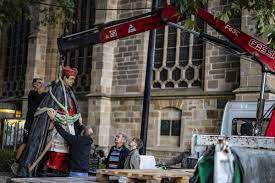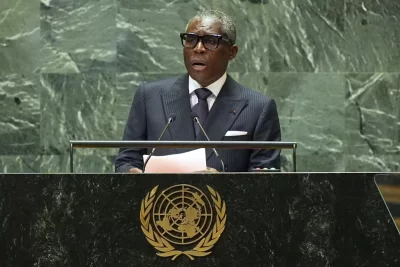
A scandal centering on sexual abuse allegations against a long-deceased cardinal has created a “very difficult situation” for the troubled Catholic Church in Germany, a top German bishop said Monday, hours after a statue of the late cleric was removed from its perch outside Essen Cathedral.
The accusations against Cardinal Franz Hengsbach, who died in 1991, added to a long-running scandal over abuse by clergy that has shaken the German church.
Last week, the Essen diocese said there were suspicions that Hengsbach may have abused a 16-year-old girl in the 1950s when he was an auxiliary bishop in nearby Paderborn, and that another person — according to German news agency dpa, also a woman — also accuses him of abusing them in 1967, when he was bishop of Essen.
In a letter to parishes released on Friday, Essen’s current bishop, Franz-Josef Overbeck, apologized for his mistakes in handling the allegations.
He said he had heard about the first accusation in 2011 but did nothing after the Vatican determined that it was not plausible. “I must now admit that the accusations were misjudged in 2011 and that those affected were wronged,” he wrote. The later abuse allegation — which the diocese says was made last October and came to Overbeck’s attention in March — led church officials to dig deeper this year.
The Essen diocese last week called on the faithful to come forward with any further abuse allegations. On Monday it said that some new reports had come in and would be reviewed, dpa reported. Hengsbach was the bishop of Essen from the diocese’s foundation in 1958 until 1991. He was made a cardinal in 1988.
In 2018, a church-commissioned report concluded that at least 3,677 people were abused by clergy in Germany between 1946 and 2014. More than half of the victims were 13 or younger, and nearly a third served as altar boys.
The Hengsbach allegations became public shortly before a regular autumn meeting of the German Bishops’ Conference, which opened on Monday. He is the highest-ranking German cleric against whom such accusations have emerged.
“This is a really very difficult situation, not just for the bishop of Essen and the whole Essen diocese, but for us as a whole,” the conference’s chairman, Limburg Bishop Georg Baetzing, told reporters in Wiesbaden. “But I say that everything must be put on the table — the truth must be put on the table; that is the only way to do right by those affected.”
Baetzing said that “the uncertainty for the faithful in this diocese, if you look at what a high pedestal this man stood on as its founding bishop … cannot be compared with anything.”
The head of an influential lay organization, the Central Committee of German Catholics, underlined why the case deepens the church’s problems.
“The suspected acts and the cover-up strategy of the church that has once again been documented destroy what confidence remains,” Irme Stetter-Karp said in a statement. “Once again, the impression arises th





